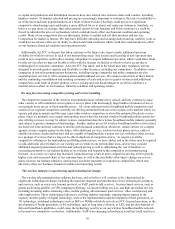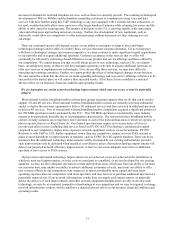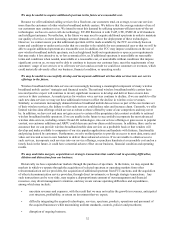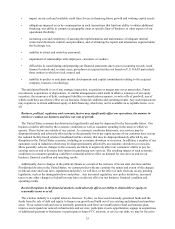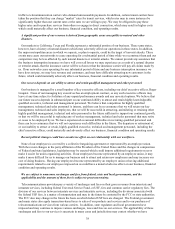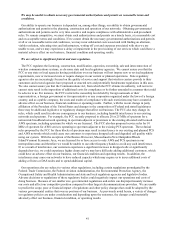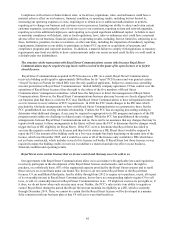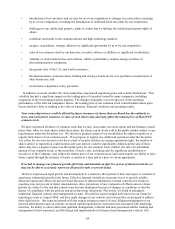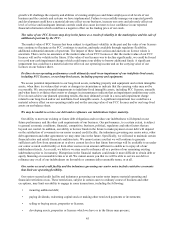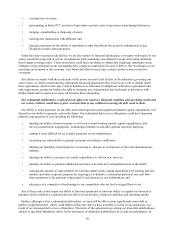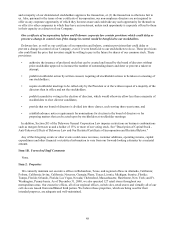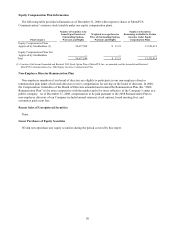Metro PCS 2008 Annual Report Download - page 49
Download and view the complete annual report
Please find page 49 of the 2008 Metro PCS annual report below. You can navigate through the pages in the report by either clicking on the pages listed below, or by using the keyword search tool below to find specific information within the annual report.40
• human error;
• disruptions beyond our control, including disruptions caused by terrorist activities, theft, or natural
disasters; and
• failures in operational support systems.
Network disruptions may cause interruptions in service or reduced capacity for customers, either of which could
cause us to lose customers and incur expenses. Further, our administrative and capital costs associated with
detecting, monitoring and reducing the incidence of fraud, or the costs to replace or repair the network, may be
substantial, thus causing our costs to provide service to increase. Fraudulent use of our network may also impact
interconnection and long distance costs, capacity costs, administrative costs, fraud prevention costs and payments to
other carriers for fraudulent roaming. Such increased costs could have a material adverse impact on our financial
results and impair our service resulting in higher churn as our competitors systems may not experience similar
problems.
Additionally, our physical facilities and information systems may be vulnerable to physical break-ins, computer
viruses, theft, attacks by hackers, or similar disruptive problems. If hackers gain improper access to our databases,
they may be able to steal, publish, delete, misappropriate or modify confidential personal information concerning
our subscribers. In addition, misuse of our customer information could result in harm to our customers and legal
actions against us and to additional harm perpetrated by third-parties who are given access to the consumer data.
This could damage our reputation which could have a material adverse effect on our business, financial condition
and operating results.
Risks Related to Legal and Regulatory Matters
Our ability to provide service to our customers and generate revenues could be harmed by adverse regulatory
action.
Our FCC licenses are major assets that we use to provide our services. Our FCC licenses are subject to revocation
and we may be subject to fines, forfeitures, penalties or other sanctions, including the imposition of mandatory
reporting requirements, license conditions, the imposition of corporate monitors, and limitations on our ability to
participate in future FCC auctions, if the FCC were to find that we are not in compliance with its rules or the
requirements of the Communications Act. We must renew our FCC licenses periodically. Renewal applications are
subject to FCC review and public comment to ensure that licensees meet their licensing requirements and comply
with other applicable FCC requirements, rules and regulations. If we fail to file for renewal of any particular license
at the appropriate time, or fail to meet any regulatory requirements for renewal, including construction and
substantial service requirements, we could be denied a license renewal. In addition, many of our licenses are subject
to interim or final construction requirements and there is no guarantee that the FCC will find our construction, or the
construction of prior licensees, sufficient to meet the applicable construction requirement. If the FCC finds that our
construction, or the construction of prior licensees, is insufficient, the FCC could terminate our license. For all PCS,
AWS and 700 MHz licenses, the FCC also requires that a licensee provide substantial service in order to receive a
renewal expectancy. There is no guarantee that the FCC will find the completed system construction sufficient to
meet the build out or renewal requirement. Additionally, while incumbent licensees enjoy a certain renewal
expectancy if they provide substantial service, the substantial service standard is not well articulated and there is no
guarantee that the FCC will conclude that we are providing substantial service, that we are entitled to a renewal
expectancy, or will renew all or any of our licenses, without the imposition of adverse conditions. In addition, a
failure to comply with applicable license conditions or regulatory requirements could result in revocation or
termination of our licenses, in the loss of rights to serve unbuilt areas and/or fines and forfeitures. The FCC may also
impose additional regulatory requirements or conditions on our licenses or our business. Such additional regulatory
requirements or conditions could increase the cost of doing business, could cause disruption to existing networks,
and could require us to make substantial investments. Any loss or impairment of any of these licenses, failure to
renew, fines and forfeitures, or the imposition of conditions could have a material adverse effect on our business,
financial condition and operating results.


